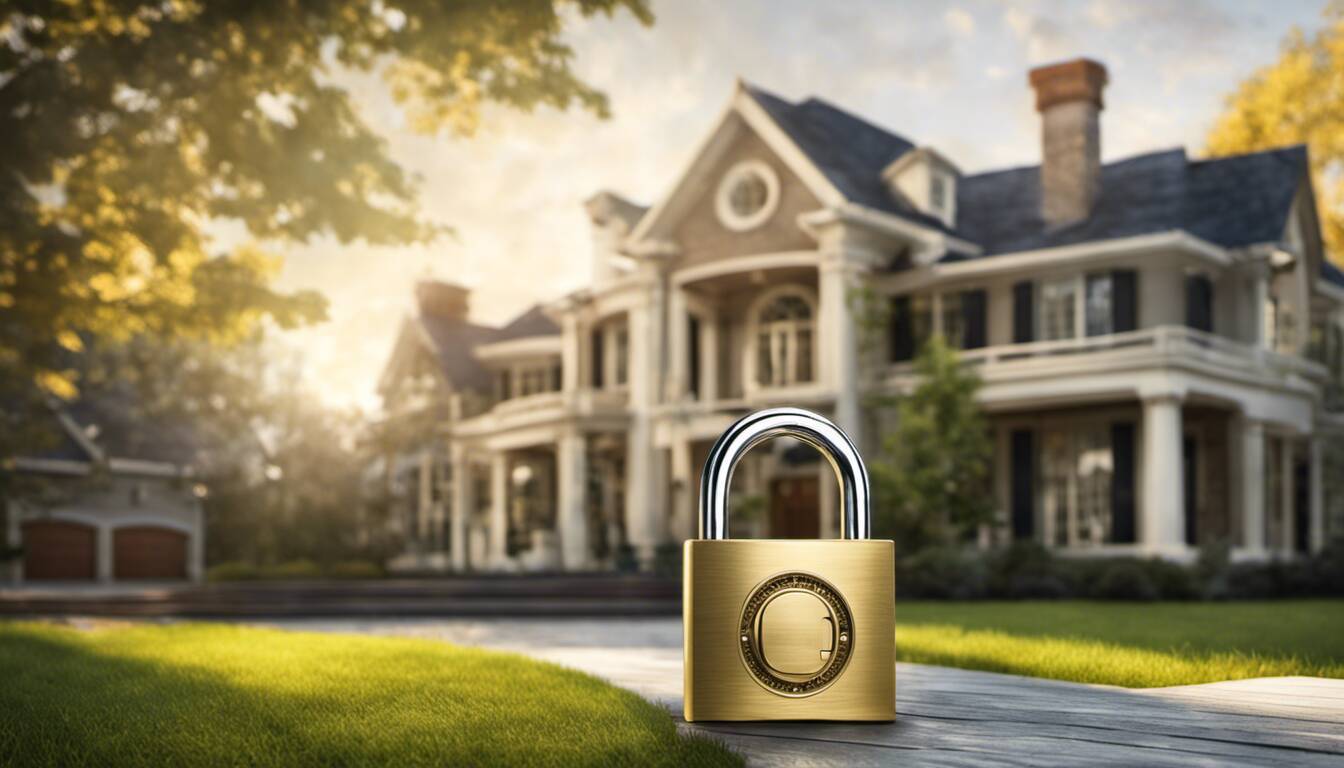Quick House Sale Scams: How to Protect Yourself and Avoid Being a Victim
Quick house sale scams generally involve unethical or fraudulent practises by a “buyer” who offers to purchase your home for below market value and provides misleading or false information. To avoid these scams, always research any potential buyer or company thoroughly, ask to see proof of funds, and work with a reputable real estate agent. Additionally, be wary of any buyers who pressure you to sign documents without proper legal advice or offer cash deposits without any supporting documentation.

Understanding Quick House Sale Scams
Selling a house is often a complex and time-consuming process. It’s no wonder that some homeowners seek quick solutions to offload their property, especially when faced with financial difficulties or other urgent situations. However, it’s crucial to be aware of the potential risks involved in quick house sale scams before rushing into any agreements. Understanding these scams can help you protect yourself and avoid falling victim to fraudulent schemes.
Quick house sale scams typically involve individuals or companies posing as legitimate buyers who promise to purchase your property at a significantly discounted price and complete the transaction within an unrealistically short timeframe. Their main objective is to exploit your vulnerability and pressure you into entering an agreement that benefits them while leaving you in a disadvantaged position.
For instance, let’s say you’re facing imminent foreclosure due to financial hardships. A scammer might approach you with an enticing offer to buy your property quickly and prevent the foreclosure process. They may claim that they have access to immediate funds and only need your cooperation to move forward with the sale. However, upon accepting their offer, you might later discover hidden fees, lower-than-agreed-upon payments, or even fraudulent documents.
To avoid falling victim to such scams, it’s essential to educate yourself about common tactics used by fraudsters in the realm of quick house sales.
Common Scam Tactics
Understanding the tactics employed by scammers can serve as a powerful defence against becoming their prey. Here are some common strategies used in quick house sale scams:
- Pressure Tactics: Scammers often create a sense of urgency by pressuring sellers to make hasty decisions without proper consideration or independent verification. They may claim that there’s little time left for a particular offer or use aggressive sales techniques to manipulate vulnerable homeowners.
- Underpriced Offers: Fraudulent buyers may lure sellers with offers well below market value, appealing to their immediate need for cash. By exploiting financial distress or time constraints, scammers aim to secure a significant profit while leaving the homeowner at a substantial loss.
- Unrealistic Timeframes: Scam artists may promise lightning-fast transactions, insisting that legal processes can be bypassed or that they have exclusive access to expedited procedures. These unrealistic timeframes are designed to inhibit adequate research and due diligence on the part of the seller.
- Upfront Fees: Some scammers may request upfront fees or financial contributions under the guise of administrative costs, processing fees, or legal expenses. These fees are often non-refundable and serve as a quick way for fraudsters to extract money from unsuspecting sellers.
- Complex Agreements: Scammers might present confusing or convoluted contractual terms in an attempt to obfuscate unfavourable conditions and deceive sellers into accepting detrimental terms without fully understanding the implications.
Being aware of these common scam tactics is essential when venturing into the realm of quick house sales. However, it’s equally important to understand the profiles of fraudulent buyers who frequently perpetrate these scams. Let’s explore this further to strengthen our defences against potential scammers.
Profiles of Fraudulent Buyers
In the realm of quick house sale scams, it’s essential to be aware of the various profiles that fraudulent buyers may adopt. By understanding the characteristics and strategies employed by these individuals or groups, you can better safeguard yourself against falling victim to their schemes.
One common profile is the “Unscrupulous Investor.” These individuals may present themselves as experienced real estate investors offering cash deals for your property. They often prey on homeowners facing financial distress or urgent circumstances. While some legitimate investors do exist, it is crucial to identify warning signs such as overly aggressive tactics, pressure to sign contracts without proper review, and insistence on closing the deal quickly without allowing time for due diligence.
Another profile to watch out for is the “Phoney Realtor.” Scammers may pose as licenced real estate agents or brokers, using fake credentials to gain your trust. They may try to convince you that their expertise will ensure a fast and hassle-free sale. However, they have hidden intentions to exploit or defraud you during the process. Always verify the credentials of anyone claiming to be a realtor by checking with the appropriate licencing authorities.
Additionally, Bogus Cash Buyers are known to target unsuspecting homeowners. They typically promise an all-cash offer at a price that seems too good to refuse. However, when it comes time for payment, they may concoct excuses or delay the transaction indefinitely. In some cases, they might even request upfront fees or deposits under false pretences.
These are just a few examples of profiles adopted by fraudulent buyers in quick house sale scams. It’s important to remain vigilant and exercise caution when dealing with potential buyers who exhibit suspicious behaviour or make unrealistic promises.
Now that we understand the profiles of fraudulent buyers, let’s explore essential strategies you can employ to protect yourself and avoid falling victim to quick house sale scams.
- According to a 2021 data from the Federal Trade Commission (FTC), approximately 16,000 complaints related to real estate fraud were reported, amounting in losses of over $213 million.
- A study by CoreLogic showed that in the second quarter of 2020 alone, approximately one in every 15,000 home loans were estimated to be fraudulent.
- The Better Business Bureau reveals that in 2022, around 67% of the complaints received about real estate scams involved quick house sales or cash-for-homes scams. This was a substantial increase from 43% reported back in 2019.
Strategies to Avoid Quick House Sale Scams
When navigating the process of selling your house quickly, it’s crucial to implement effective strategies that safeguard you against potential scams. By following these steps, you can mitigate the risk of becoming a victim and ensure a smooth and legitimate transaction.
- Research Potential Buyers: Before engaging with any buyer or investor, conduct thorough research on their background, reputation, and track record. Check online reviews, references, and local business directories to gather as much information as possible. Legitimate buyers will have an established presence and positive feedback.
- Ask for Proof of Funds: When working with cash buyers, request proof of funds to ensure they have the financial means to complete the purchase. Legitimate buyers should be willing to provide this documentation upon your request.
- Verify Credentials: For real estate agents or brokers, confirm their credentials by checking with the appropriate licencing authorities. This verification process helps confirm their legitimacy and credibility.
- Consult Professionals: Seek guidance from professionals who specialise in real estate transactions, such as attorneys or experienced realtors. Their expertise can help detect red flags, verify documentation, and guide you through the process to ensure a legitimate sale.
- Don’t Rush the Process: Be wary of buyers pressuring you to make quick decisions or sign contracts without adequate time for review. Fraudulent individuals often rely on creating a sense of urgency to exploit unsuspecting sellers.
- Read Contracts Thoroughly: Take your time to carefully read and understand all terms and conditions outlined in contracts or agreements before signing them. If something seems unclear or raises suspicion, seek legal advice for clarification.
- Secure Independent Valuations: Obtain independent valuations of your property to ensure you have a realistic understanding of its market value. This knowledge empowers you to make informed decisions when negotiating with potential buyers.
Remember, trust your instincts throughout the process. If something feels off or too good to be true, take a step back and thoroughly evaluate the situation. By implementing these strategies, you can minimise the risks associated with quick house sale scams and protect yourself from falling victim to fraudulent schemes.
Due Diligence Measures
When it comes to selling your house quickly, due diligence is key to protect yourself from falling prey to scams. Here are some essential measures you should take:
First and foremost, research is crucial. Take the time to thoroughly investigate the company or individual offering a quick house sale. Look for reviews and testimonials from previous customers, and check if they are registered with reputable organisations such as the National Association of Property Buyers (NAPB) or The Property Ombudsman.
Furthermore, don’t hesitate to ask for references from past clients and even contact them directly to inquire about their experience. A legitimate company will be open and transparent in providing this information.
Conducting property inspections is another critical aspect of due diligence. Hire a professional surveyor or independent valuer to assess the condition of your property and provide an accurate valuation. This step ensures that you have a realistic understanding of your property’s worth before entering into any agreement.
Additionally, carefully review all contracts and legal documents involved in the quick house sale. If you’re unsure about any terms or conditions, seek advice from a qualified solicitor or legal expert specialising in property transactions. They can help clarify any ambiguities and ensure you’re protected throughout the process.
Lastly, be wary of any upfront fees demanded by the buyer. Reputable house buying companies typically do not require payment upfront. If a buyer insists on charging fees before completing the sale, it could be a red flag indicating potential scam activity. Exercise extreme caution and consider seeking alternative options.
Remember, due diligence is your best defence against scams when pursuing a quick house sale.
Smart Contract Negotiation Tactics
Once you’ve completed your due diligence and identified a trustworthy buyer for your quick house sale, employing smart negotiation tactics can help you secure a fair deal. Here are some strategies to consider:
Firstly, establish clear goals and priorities before entering into negotiations. Determine the minimum acceptable price for your property and any specific conditions you insist upon, such as a quick closing or flexibility with moving dates.
During negotiations, it’s crucial to maintain a calm and professional demeanour. Keep emotions in check and focus on finding mutually beneficial solutions. Remember that successful negotiation is about compromise rather than trying to “win” the entire deal.
Consider utilising leverage points to your advantage. For example, if there are multiple interested buyers, you can create competition by carefully managing the presentation of offers. This can lead to improved terms or a higher sale price.
It’s also beneficial to be knowledgeable about current market conditions and comparable sales in your area. Familiarise yourself with recent property sales in your neighbourhood and use this information to support your asking price and negotiate effectively.
Lastly, if you feel uncomfortable or unsure about any aspect of the negotiation process, don’t hesitate to seek advice from a real estate agent or legal professional. Their expertise can provide valuable guidance and help you navigate more complex negotiations.
By employing these smart contract negotiation tactics, you can increase your chances of securing a favourable deal while safeguarding your interests.
Recognising the Red Flags of a Scam
Whether you’re in a hurry to sell your house or are simply exploring quick house sale options, it’s crucial to be aware of the red flags that may indicate a potential scam. Scammers prey on vulnerable homeowners who are desperate or susceptible to manipulative tactics. By recognising these warning signs, you can protect yourself and avoid falling victim to quick house sale scams.
One of the most significant red flags is inconsistent or unreliable information from the cash buyer. If their story or promises seem too good to be true, it’s essential to exercise caution. Unsolicited offers received via phone, mail, or email should also raise concerns, especially if they come before you’ve had a chance to research local cash buyers. Legitimate buyers will typically not pressure you into accepting an offer immediately.
Unprofessional behaviour from the buyer is another warning sign. If they engage in aggressive sales tactics, use unprofessional language, or become non-responsive when you ask for more information or proof of funds, it’s best to steer clear. Transparency is vital when it comes to the buying process, fees, and the offer itself. If the buyer avoids providing key information or is evasive about their processes, it’s wise to be wary.
Consider this scenario: You receive an unsolicited email offering a cash deal on your property that is well above market value. The buyer insists on closing within a week and pressures you with constant contact. When you try to verify their legitimacy by asking for proof of funds, they become defensive and refuse to provide any concrete evidence. These red flags indicate a potential scam in progress.
Additionally, scammers often lack a digital footprint or any traceable online presence. Legitimate companies usually have websites, social media profiles, and reviews from previous clients. If you can’t find any information about the buyer online or their digital presence seems suspiciously nonexistent, it may be a warning sign.
Other red flags include requests for wired funds or overpayment refunds after sending money by check. Reputable buyers will not ask for wired funds, and any request for an overpayment refund is likely a scam. Refusal or inability to provide references from previous satisfied customers should also make you sceptical. It’s crucial to thoroughly research and verify the reputation and credibility of any potential buyer before entering into any agreements.
Now that we’ve explored the warning signs of quick house sale scams, let’s shift our focus to understanding how to spot legitimate quick house sales and ensure a safe and secure transaction.
Legitimate Quick House Sales: Spotting the Difference
While it’s essential to be vigilant about scams, it’s equally important to recognise legitimate quick house sales. Working with reputable and local cash buyers who have a history in the industry is key to ensuring a safe transaction. Companies like New Again Houses can provide you with the peace of mind that comes with dealing with trustworthy and reliable buyers.
One of the main benefits of working with reputable cash buyers is the speed at which they can complete the closing process. Unlike traditional real estate transactions that involve inspections, appraisals, and loan processing, cash sales can bypass these lengthy procedures. This means you can sell your house quickly without the uncertainty of buyer financing falling through.
Another advantage is that reputable cash buyers will purchase your property as-is, saving you from costly repairs or renovations before selling. They understand that selling a house in its current condition is appealing to homeowners looking for convenience and speed.
Let’s say you need to relocate urgently due to a job transfer or personal circumstances, but your home requires extensive repairs. Selling it through traditional methods would take time and effort that you simply don’t have. However, reputable cash buyers will evaluate your property’s worth in its current state and offer a fair price without requiring you to undertake any repairs or upgrades.
The transparency and reliability of legitimate cash buyers also provide peace of mind. They will clearly explain the buying process, any associated fees, and the details of their offer. You won’t have to worry about hidden costs or surprises along the way.
Being able to differentiate between quick house sale scams and legitimate options is crucial for a smooth and secure transaction. By recognising the warning signs discussed earlier and opting for reputable cash buyers, you can navigate the quick house sale market with confidence and protect yourself from potential scams.



